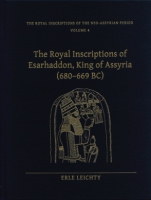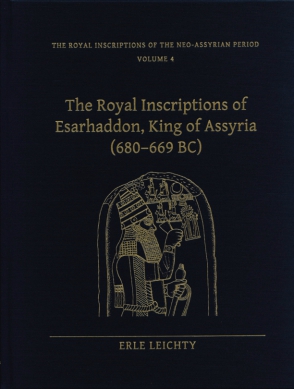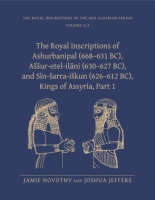The Royal Inscriptions of Esarhaddon, King of Assyria (680–669 BC)
Erle Leichty
The Royal Inscription of Esarhaddon, King of Assyria (680–669 BC) is the inaugural volume of the Royal Inscriptions of the Neo-Assyrian Period Project. The volume provides reliable, up-to-date editions of all of the known royal inscriptions of Esarhaddon, a son of Sennacherib who ruled Assyria for twelve years (680–669 BC). Editions of 143 firmly identifiable texts (which mostly describe successful battles and the completion of building projects, all done ad maiorem gloriam deorum), 29 poorly preserved late Neo-Assyrian inscriptions that may be attributed to him, and 10 inscriptions commissioned by his mother Naqia (Zakutu) and his wife Esharra-hammat are included. To make this corpus more user-friendly to both specialist and laymen, each text edition (with its English translation) is supplied with a brief introduction containing general information, a catalogue containing basic information about all exemplars, a commentary containing further technical information and notes, and a comprehensive bibliography (arranged chronologically from earliest to latest).
- Description
- Table of Contents
- Links
The volume also includes: (1) a general introduction to the reign of Esarhaddon, the corpus of inscriptions, previous studies, and dating and chronology; (2) translations of the relevant passages of three Mesopotamian chronicles; (3) 19 photographs of objects inscribed with texts of Esarhaddon; (4) indexes of museum and excavation numbers and selected publications; and (5) indexes of proper names (Personal Names; Geographic, Ethnic, and Tribal Names; Divine, Planet, and Star Names; Gate, Palace, Temple, and Wall Names; and Object Names). Transliterations of selected inscriptions arranged in a ‘musical score’ format are made available on Oracc’s website.
The Royal Inscriptions of the Neo-Assyrian Period (RINAP) series will present up-to-date editions of the royal inscriptions of a number of late Neo-Assyrian rulers, beginning with Tiglath-pileser III (744–727 BC). This new series is modeled on the publications of the now-defunct Royal Inscriptions of Mesopotamia (RIM) series and will carry on where its RIMA (Royal Inscriptions of Mesopotamia, Assyrian Periods) publications ended. The project is under the direction of G. Frame (University of Pennsylvania) and is supported by the National Endowment for the Humanities.
List of Figures
Foreword
Preface
Editorial Notes
Bibliographical Abbreviations
Other Abbreviations
Object Signatures
Introduction
I. Assyria
Nineveh
Prisms — Nos. 1–9
Cylinders — Nos. 10–18
Stone slabs — Nos. 19–22
Brick — No. 23
Game boards — No. 24
Stone vessels — Nos. 25–29
Clay tablets — Nos. 30–56
Aššur
Prisms — Nos. 57–58
Cylinders — No. 59
Stone tablet — No. 60
Stone blocks — Nos. 61–67
Stone door sockets — Nos. 68–69
Stone vessels — Nos. 70–73
Stone object — No. 74
Stone amulets — No. 75
Clay tablet — No. 76
Kalhu
Cylinders — Nos. 77–80
Stone slabs — Nos. 81–87
Bricks — Nos. 88–89
Cylinder seal impression — No. 90
Stone vessel — No. 91
Clay lump — No. 92
Tarbisu
Cylinder — No. 93
Stone slabs — Nos. 94–95
Bricks — No. 96
II. Anatolia and Syria-Palestine
Til Barsip steles — No. 97
Zinçirli stele — No. 98
Clay tablets (duplicating Zinçirli) — Nos. 99–101
Qaqun stele — No. 102
Nahr el-Kelb rock relief — No. 103
III. Babylonia
Babylon
Prisms — Nos. 104–112
Cylinder — No. 113
Stone monument — No. 114
Assyrian hieroglyphs — No. 115
Clay tablets — Nos. 116–117
Cylinder seal — No. 118
Bricks — Nos. 119–126
Borsippa
Cylinder — No. 127
Nippur
Cylinders — Nos. 128–130
Bricks — Nos. 131–132
Uruk
Cylinders — Nos. 133–136
Bricks — Nos. 137–139
IV. Miscellaneous Objects
Silver vessel — No. 140
Bronze animal — No. 141
Eyestone — No. 142
Stone cylinder — No. 143
V. Uncertain Texts
Prisms — Nos. 1001–1004
Cylinders — Nos. 1005–1006
Steles — Nos. 1007–1008
Brick — No. 1009
Clay tablets — Nos. 1010–1020
Stone object — No. 1021
Stone vessels — Nos. 1022–1029
Misidentified cylinder — No. 1030
VI. Royal Women
Ešarra-hammat inscriptions
Eyestone — No. 2001
Stone block — No. 2002
Naqi’a / Zakutu inscriptions
Prisms — No. 2003
Cylinder — No. 2004
Clay tablets — Nos. 2005–2006
Stone beads — Nos. 2007–2009
Bronze relief — No. 2010
Minor Variants and Comments
Index of Museum Numbers
Index of Excavation Numbers
Index of Names
Concordances of Selected Publications
Scores of Inscriptions are made available on Oracc.
Scores of Inscriptions are made available on Oracc.
Also of Interest
Mailing List
Subscribe to our mailing list and be notified about new titles, journals and catalogs.





